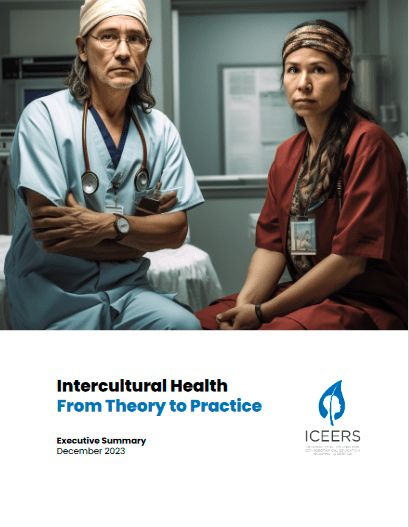ICEERS | 20 December 2023
Intercultural health is emerging as a transformative approach to healthcare, integrating Western medical practices with traditional Indigenous healing methods. This comprehensive system is becoming increasingly vital in countries with Indigenous populations. The latest report from ICEERS offers a deep dive into this concept, covering its historical, political, theoretical, and practical aspects.
The Intercultural Health Report analyzes successful examples, such as in India and China, where traditional medicine has been effectively incorporated into healthcare systems. Additionally, it presents practical cases and strategies implemented in Latin America, Africa, and Oceania, aimed at overcoming the common challenges of including Indigenous and traditional medical practices in global healthcare systems. The purpose of this guide is to analyze intercultural health proposals in countries with Indigenous and traditional populations, identifying obstacles and suggesting strategies to improve the health of these communities.
A Vision for Holistic Healing
Building bridges between different knowledge systems is fundamental for the work of ICEERS, especially concerning medical knowledge related to the health of individuals, communities, and territories. During our collaborations with allies in regions such as the Amazon or Central Africa, we engage with peoples and communities who have specific wisdom on medicinal plants and possess highly sophisticated traditional health knowledge. In many of these regions, there is a strong desire to establish comprehensive health centers, providing access to the strengths of both the Indigenous traditional system and the Western biomedical system.
The respectful integration of different models creates an enriching dialogue allowing a holistic understanding of health and well-being. Valuing and integrating Indigenous ancestral knowledge with advancements in Western medicine can promote a more complete and respectful view of healing, recognizing the importance of cultural diversity and traditional knowledge in disease treatment and health maintenance. This intercultural approach not only enriches medical practices but also respects and preserves the heritage of Indigenous peoples, fostering a future where health and wisdom can coexist harmoniously.
With this focus on building bridges between different medical and knowledge systems, ICEERS has developed the Intercultural Health Guide that explores recent advances in the integration of Indigenous traditional medicine with Western biomedicine. (The full report is available in Spanish with Executive Summaries in both English and Spanish). The guide highlights the relevance of complementarity in improving healthcare services. It emphasizes how international conventions and declarations have contributed to the political and cultural recognition of Indigenous medical practices.
Historical Recognition and Institutional Frameworks
Traditional Indigenous medicine has faced stigmatization for years, often dismissed as superstitious or ineffective. However, international declarations like the Alma-Ata Declaration of 1978, the International Labour Organization Convention 169 of 1989, and the United Nations Declaration on the Rights of Indigenous Peoples of 2007 have underlined its significance. They emphasize the holistic nature of health and advocate for integrating traditional medicine into official healthcare systems.
Countries in Latin America have taken significant steps to integrate traditional medicine into their healthcare systems. Each nation has developed unique policies and institutions, acknowledging the role of traditional practices in their national health systems. Africa has also made an effort to integrate these practices into mainstream healthcare. Ghana, for instance, has been a leader in this integration, incorporating herbal medicine within its official healthcare system and launching academic programs to promote and regulate these initiatives.*
Intercultural Health Models
The practical application of intercultural health can be categorized into three models:
- Intercultural Sensitivity Model: Adapts traditional medicine to the sociocultural needs of Indigenous patients without integrating it into the official healthcare system.
- Parallel Intercultural Model: Offers traditional medicine within the official health system but without integration with Western medicine.
- Integrated Intercultural Model: Represents a true unification of modern and traditional knowledge, where traditional and Western medical practitioners work collaboratively.
Challenges and Key Considerations for Successful Implementation
Implementing intercultural health projects comes with its challenges, such as the dominance of biomedical perspectives, issues around the standardization of plant-based medicinal preparations, institutionalization challenges, and the complexities of integrating traditional healers into official healthcare systems.*
For a successful intercultural health model, certain key factors must be considered:
- Training: Western health professionals need to be educated about traditional health systems and the historical context of discrimination against Indigenous peoples.
- Mediation: Official health systems should develop effective mediation strategies between healthcare professionals and Indigenous patients.
- Holism: Designing primary health care based on a deep understanding of the social, productive, ritual, familial, and community context.
In models like those adopted in Australia, the coordination and recognition of traditional doctors are crucial. This involves establishing organizations for coordination, an accreditation process for traditional doctors, a public registry, streamlined hiring processes, and a database for tracking interventions. (For further information on these challenges, check out the Executive Summary of the report).
Final Thoughts
Intercultural health not only safeguards traditional practices but also enhances overall healthcare outcomes. This approach requires a nuanced understanding of different healing traditions and a commitment to respecting and integrating these diverse knowledge systems. Embracing this intercultural perspective enriches medical practices. It also honors and preserves the intangible heritage of Indigenous peoples, nurturing a future where health and wisdom harmoniously coexist. The journey towards a fully integrated intercultural health system is complex but crucial for ensuring equitable and effective healthcare for all people, especially for the most disadvantaged.
*References for this article are available in the Executive Summary and complete report.


